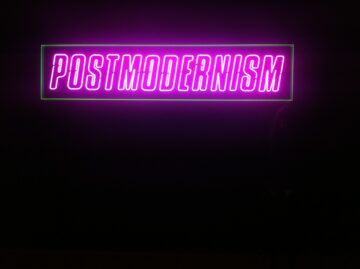The Editors at n+1:
 When exactly did we stop hearing the word postmodernism? Fredric Jameson’s death this fall at the mighty age of 90 left us wondering. (The question reemerged a few weeks later with the reelection of Donald Trump, who for all his ominous contemporaneity is trailed by a permanent miasma of the tacky, made-for-TV ’80s.) The subtitle of Jameson’s Postmodernism, or, The Cultural Logic of Late Capitalism has enjoyed an enduring popularity into the 21st century, with academic treatises on this or that form-and-content dialectic recycling the formula like they’re trying to solve the 1980s landfill crisis.* But the headline term now has the status of relic, an outgrown holdover from a wavier time. Art critics we know report avoiding postmodern as a descriptor unless writing in the past tense; academics abandoned it years ago somewhere on the battlefields of the theory wars. In literature and film, one encounters rather less metafiction and upcycled kitsch than might be expected in our AI- and IP-laden times. One recent exception, Francis Ford Coppola’s brashly pomo production Megalopolis, confirmed our suspicion that only architects still embrace the P-word — architects, and a smattering of far-right YouTubers, who decry “postmodernism” as a gateway drug to low-IQ wokeness, immorality, and (only sort of wrongly) Marxism.
When exactly did we stop hearing the word postmodernism? Fredric Jameson’s death this fall at the mighty age of 90 left us wondering. (The question reemerged a few weeks later with the reelection of Donald Trump, who for all his ominous contemporaneity is trailed by a permanent miasma of the tacky, made-for-TV ’80s.) The subtitle of Jameson’s Postmodernism, or, The Cultural Logic of Late Capitalism has enjoyed an enduring popularity into the 21st century, with academic treatises on this or that form-and-content dialectic recycling the formula like they’re trying to solve the 1980s landfill crisis.* But the headline term now has the status of relic, an outgrown holdover from a wavier time. Art critics we know report avoiding postmodern as a descriptor unless writing in the past tense; academics abandoned it years ago somewhere on the battlefields of the theory wars. In literature and film, one encounters rather less metafiction and upcycled kitsch than might be expected in our AI- and IP-laden times. One recent exception, Francis Ford Coppola’s brashly pomo production Megalopolis, confirmed our suspicion that only architects still embrace the P-word — architects, and a smattering of far-right YouTubers, who decry “postmodernism” as a gateway drug to low-IQ wokeness, immorality, and (only sort of wrongly) Marxism.
more here.
Enjoying the content on 3QD? Help keep us going by donating now.
